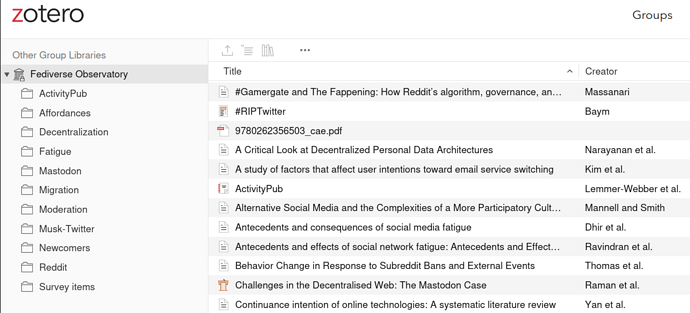We are at a stage where more academic research becomes available on decentralized social networking. This list topic is a place to collect them.
Mastodon over Mammon: towards publicly owned scholarly knowledge
By Björn Brembs, Adrian Lenardic,Peter Murray-Rust, Leslie Chan and Dasapta Erwin Irawan
CC-BY-4.0, https://doi.org/10.1098/rsos.230207
Abstract
Twitter is in turmoil and the scholarly community on the platform is once again starting to migrate. As with the early internet, scholarly organizations are at the forefront of developing and implementing a decentralized alternative to Twitter, Mastodon. Both historically and conceptually, this is not a new situation for the scholarly community. Historically, scholars were forced to leave social media platform FriendFeed after it was bought by Facebook in 2006. Conceptually, the problems associated with public scholarly discourse subjected to the whims of corporate owners are not unlike those of scholarly journals owned by monopolistic corporations: in both cases the perils associated with a public good in private hands are palpable. For both short form (Twitter/Mastodon) and longer form (journals) scholarly discourse, decentralized solutions exist, some of which are already enjoying some institutional support. Here we argue that scholarly organizations, in particular learned societies, are now facing a golden opportunity to rethink their hesitations towards such alternatives and support the migration of the scholarly community from Twitter to Mastodon by hosting Mastodon instances. Demonstrating that the scholarly community is capable of creating a truly public square for scholarly discourse, impervious to private takeover, might renew confidence and inspire the community to focus on analogous solutions for the remaining scholarly record—encompassing text, data and code—to safeguard all publicly owned scholarly knowledge.
See also:
And: The Fediverse is an opportunity learned societies can't ignore | Hacker News
Can This Platform Survive? Governance Challenges for the Fediverse
By Thomas Struett, American University - School of Communication, Aram Sinnreich, American University - School of Communication, Patricia Aufderheide, American University - School of Communication, Rob Gehl, York University.
https://dx.doi.org/10.2139/ssrn.4598303
Abstract
In the wake of recent high-profile crises at commercial social media platforms such as Twitter and Reddit, the “fediverse” has gained both adoption and visibility as a viable non-commercial alternative for individuals, communities, and institutions to develop channels of public communication, dialogue, and debate. In this paper, we draw upon illustrative examples from the history of digital civic discourse, and identify six ways in which history shows us how the potential benefits of the fediverse are at risk of being subverted. We will discuss several specific potential threats to these spaces of civil discourse, including: challenges inherent to distributed governance, commercial platform capture, inclusive access, moderation at scale, reputational assaults by commercial competitors, and the tacitly neoliberal techno-Romanticism familiar from previous digital innovations. These threats must be addressed collectively and proactively by key fediverse stakeholders, in an ecology whose ruling values are non-commercialism, decentralization, open source, free association, and wariness of traditional governance.
Also posted to: Can This Platform Survive? Governance Challenges for the Fediverse - Fediverse Futures - SocialHub
The Digital Covenant: Non-Centralized Platform Governance on the Mastodon Social Network
By Robert W. Gehl (see profile) , Diana Zulli
CC-BY-NC-4.0, https://doi.org/10.17613/1b0d-kb17
Abstract
The majority of scholarship on platform governance focuses on for-profit, corporate social media with highly centralized network structures. Instead, we show how non-centralized platform governance functions in the Mastodon social network. Through an analysis of survey data, Github and Discourse developer discussions, Mastodon Codes of Conduct, and participant observations, we argue Mastodon’s platform governance is an exemplar of the covenant, a key concept from federalist political theory. We contrast Mastodon’s covenantal federalism platform governance with the contractual form used by corporate social media. We also use covenantal federalist theory to explain how Mastodon’s users, administrators, and developers justify revoking or denying membership in the federation. In doing so, this study sheds new light on the innovations in platform governance that go beyond the corporate/alt-right platform dichotomy.
Zotero: Fediverse Observatory
This Zotero library contains over 100 research-related documents, and looks to be well-maintained.
